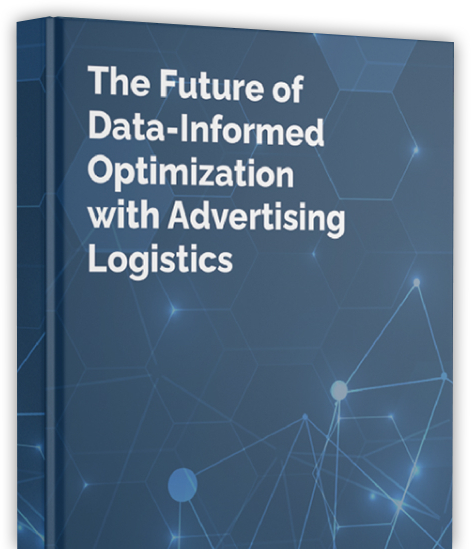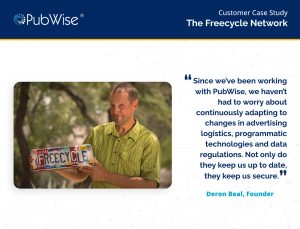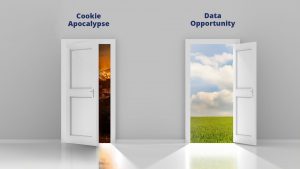Description
The fast-approaching cookie crackdown (third-party cookies, 3PCs) has many companies fearing the future state of digital advertising. But for Stephen, it’s seen as much more of an opportunity.
As the first fully observable programmatic advertising platform, the removal of third-party cookies plays right into the vision PubWise has been dreaming of.
This week we learn more about how this momentous shift in the evolution of the internet will amplify the need for radical observability and benefit users across the globe.
Transcript
Tony Winders: Hi, we’re back. I’m Tony Winders and I’m here with Stephen Johnston, the Founder and CTO of PubWise, and we’re going to put Stephen On The SPOT again, this time, about the demise of cookies in digital advertising, and how that pertains to privacy and consumer related issues, how it’s affecting the whole ad ecosystem and the things that PubWise is doing to mitigate or capitalize on that change in the industry as the case may be. So Stephen, thanks for letting me put you on the spot again, what’s your take on cookies going away at a high level or right down into the weeds of why PubWise is better?
Stephen Johnston: First off, I do think it’s an opportunity, and often opportunities have a bit of pain. And so, there are things that have to be done. But I think long term, more privacy, and less high fructose corn syrup targeting, this sort of cheap, low value, empty calorie thing. Yes, it does the job, but put it in the same context of food, there’s better ways to fuel the body, there’s better ways to fuel monetization. And so where these things are pushing towards is actually right into the publishers wheelhouse, which is back into first party data, back into actual relationships with the person that you’re building that targeting around. So, capitalized on properly, that’s a massive opportunity. And it removes this whole class of people whose sole thing is just leveraging, bottle up, repackaging and selling back to the publisher their own data, so I think it’s a huge opportunity.
Tony Winders: So take the lens out one step, Google’s decision removes the third party cookie, it’s not really about first party cookies.
Stephen Johnston: That’s an important distinction. Should we talk about the cookie apocalypse, should we talk about, “Well, the cookies are going to die.” Well, the cookies are the fundamental programming and architectural reality, the cookie is not going anywhere. So we really need to differentiate between third party and first party. Third party cookies are going away. You can’t have a website with login and doing anything useful without cookies. And I think that is important. That’s where it pushes to first party data. And then that first party cookie really becomes not even the enabler of targeting and that gets into more technical elements. But I think that talking about the first party cookie focuses on where people need to start their strategy, which is, what allows you to build a relationship with a visitor to your site? Because that relationship requires a first party cookie, the login, or their long term sort of interaction with you. On that, you build your first party data set, the cookie’s not really what’s enabling it. And maybe that’s a little bit abstract of a concept. But, think of it more like, the relationship of a website is enabled by cookies, first party cookies, once that website has a relationship, that’s their doorway to first party data that becomes valuable. The data will be sent server to server through other means, not through cookies. Right now, this cookie sits between and allows all these on the third party basis to relate. There’s better ways to do that, so the opportunity further is, can we send more data, more breadth of data, can we update and append because we’ve got that first party relationship? Because right now, you’re letting this black box separate from you, make all of those decisions.
Tony Winders: So then tie it back to the end-to-end, fully observable platform that PubWise is building. To the point of playing into the publisher’s benefit, tie it all together for me.
Stephen Johnston: Once you’ve got that relationship, and let’s think a little more broadly, so you go, first party, you’ve got other identities, you’ve got contextual data about what they’re on. All of those things need to find ways to fill the gap or let’s put the fourth, as of yet unknown technology, we might put FLoC, but FloC is dead, it’s crap but it’s Google and so everybody does their little bit of fealty and makes nice and makes articles about it, but it’s junk. But something will come in maybe and fill that void. And of those, they all have challenges when you hand that data off. And they all have challenges in how you get that data into other systems. So, part of our vision is to connect all the way from the first party data to the buyer. That is the end-to-end. So now, you could say, “Hey, we’re going to do first party data, we’re gonna come in, and we’re gonna be your publisher partner.” And then we only go as far as what, the first ORTB connection? So now we have to figure out how to send that data, how to make sense of it. Now, every time you send that data, there’s a negotiation, are we speaking the same language? Are we talking about this the same way? When in reality, now you’re playing this game of telephone, it’s an auto intender, well, maybe it’s a buyer in the last 30 days, maybe it’s an auto looky loo, who knows how this flows through. And eventually, you get to the DSP, and who knows if what it’s saying is that it’s a person who buys commercial auto glass. And that’s an absurd sort of version of it. But we know that that happens, we know these kinds of games of telephone, and essentially, that first party data loses value as it goes through the value chain. And there’s 100 ways to represent that and it’s a lot more technical and they lose value. When you control that platform, we don’t have to play the game of telephone, we bring in the data, we curate it all the way through, the system speaks the same language, and most importantly, we’re communicating directly with the buyers and saying, “How is it that you want this to be represented?” So now, we’ve just got one step. That’s the value of going end-to-end.
Tony Winders: When you talk about the first party data, kind of you pulling it into your system and all the way through to the buyer, in the absence of the cookie, what is it replaced by? What’s the technical mechanism that makes that possible? Or put differently, how does the buyer buy that audience profile? Could you make that more tangible?
Stephen Johnston: It was always a mechanism to find a way to explain how a visitor aligns to the goals of a buyers campaign. So I want to put this in front of 40 year old mothers of two who are looking for a car, and maybe that’s a minivan. So it was always about aligning the campaign goals. And I want to simplify it, we often think of a person you want to advertise to, but it can be more complex than that, you can have other information that just says, “our campaign’s working.” So the cookie was always just to get, you have a goal with your campaign, it’s an advertising goal, it has certain aspects of the traffic that will respond to your campaign of the people. And anything else that does that in a more respectful privacy focused way, or a way that frankly, can’t be stopped, which is more like first party data. Then we’ll fill that void and we’ll fill that need. I started talking about this as high fructose corn syrup, giving it to someone else, letting them all collect it in one place was easy, the newer solutions are a little harder, it’s going to be a little bit more work on the publisher side, they’re going to have to think of first party data, they’re going to have to think of what they can acquire about that person. The main challenge is that a site over here that has really good targeting data could be leveraged in a site over here that has really poor targeting data, but has a lot of traffic. Ultimately, I think we may see the demise of some forms of arbitrage that rely on acquiring high volumes of targetable through third party cookies, to low quality content, that then relies on the third party targeting to ascribe value to it. So the secondary effect here is that if those impressions drop globally, because all this traffic is more difficult to monetize when it itself does not send value signals as well, then the value of the remaining high quality inventory goes up. That’s just another benefit I expect to see out of it. And it’s a little bit down the road but I think that there’s benefits all around high quality publishers, if they put in the work. You have to go and lift the weights, you have to go get on the treadmill, and publishers have some work to do. But critically, there’s companies like ours, where we at least handle the technology, we’ll handle paying attention to what’s the next pipe that’s going to connect these things to buyers. So you have to do the work to get the data, we can take off the work of connecting that data to people who value it. That’s where we come in, whether it’s leveraging the end- to-end connectivity, leveraging pushing it into Prebid, leveraging pending requests out to existing SSPs. We’re really pragmatic about how we approach it, yes, we want to run everything through our pipes, we’re connected to everybody. We’ll connect you to all your existing SSP relationships and all that other stuff. And when they say, “We want to see data in this format,” we’ll activate that. When they say, “We want to see this information and we want it phrased this way,” we’ll activate all of that on the platform.
Tony Winders: What’s the time horizon for publishers to deal with this? Can they start now? Should they start now? Or do we have a bit of a respite until next year?
Stephen Johnston: There’s been a repeated kick-the-can on Google’s part, I think that right now, publishers should be focused on Safari. Safari already behaves in essentially a cookie-free manner in terms of third party cookies. And if you can start to look at historical data, and over the last year or so how has Safari been affected, and if you can come up with solutions to reawaken monetization in there, I think you’ll have largely solved the problem. That’s a recommendation actually made by Stephanie Layser at News Corp. She’s saying, “Go out, fix Safari.” And that will be functionally the solution for Chrome, when Chrome turns off, which is 70% of the market instead of five, or ten, or whatever the Safari percentage is, and that’s not going to happen till 2023. So there’s enough time to resolve it. We look at our value as an optimization technology, finding the valuable connections that raise the value of your publisher inventory, and searching the space, staying nimble, staying dynamic, and not having a publisher have to constantly build new technology for everything that seems to be a solution for this kind of problem. And instead, they need to focus on getting the data, getting that first party data, understanding semantic categorization or contextual categorization for their content, so that they can surface it through the pipes that we make available to them.
Tony Winders: Those are great little pieces of advice for publishers, I love that, Stephen. Is there anything else you want to make sure that we put out there in terms of the cookie for this particular snapshot of it?
Stephen Johnston: Well, I think that publishers should get rid of the doom and gloom. I think this is an opportunity to prove the perception of the market on the buy side and explain why getting access to data directly from the publisher, long term, provides more value to the buyer. And the cookie-apocalypse is the middle man’s problem, not the guys at the ends, not long term, in my opinion. So we should get positive about it. It’s the new cookie opportunity instead of the cookie-apocalypse.
Tony Winders: I love that. Well, we can really leave it right there. I think that parting shot that it’s just not as scary as some might make it seem. And it really speaks to the fact that this whole middleman ecosystem has been built up between the publisher and the advertiser. And it seems like you can see a pathway forward where a lot of that goes away as a result.
Stephen Johnston: The whole thing accretes to the benefit of high quality publishers. So if you’re there, work with a high quality vendor like us who can help you with the technical connectivity. And there’s opportunity here.
Tony Winders: The cookie opportunity. You heard it here first. Thanks, Stephen, for letting me put you on the spot. I look forward to our next conversation. This has been On The SPOT with Stephen Johnston, Founder and CTO of PubWise, I’m Tony Winders and we’ll see you next time.





